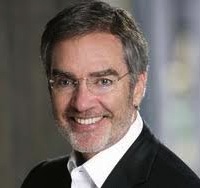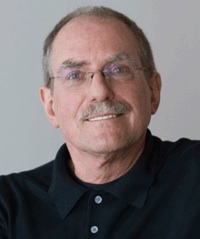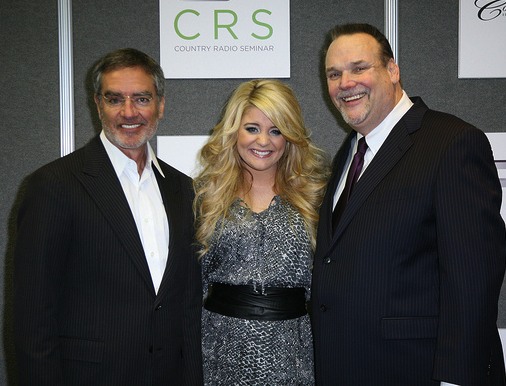
 Country Radio Seminar 2012 officially opened its first full agenda day, Wednesday February 22, with a keynote address form Clear Channel CEO Bob Pittman and a presentation from futurist David Houle.
Country Radio Seminar 2012 officially opened its first full agenda day, Wednesday February 22, with a keynote address form Clear Channel CEO Bob Pittman and a presentation from futurist David Houle.
But first, Country Radio Broadcasters Executive Director Bill Mayne welcomed the crowd with hopes that the upcoming event might accomplish three basic things for the gathered attendees—increase station revenues, market share and advance personal careers.
Next it was Nashville Mayor Karl Dean’s turn to salute the convention crowd. Dean pleaded with a big smile, “Please spend a lot of money while you’re here.” Dean then told the crowd about the city’s new convention center scheduled to open in April 2013, Music City Center. He also discussed the new Omni Hotel that would connect with a Country Music Hall of Fame that would double in size. “The Hall of Fame has seen about 450,000 visitors in the past year,” Dean said. “And that is during very challenging times, especially with all the construction and parking issues in the area. We’re confident that once completed that visitor count will double.”
Bob Pittman, a former CEO of MTV Networks and COO of America Online was next. “America loves radio,” said Pittman. “There’s nothing wrong with this business. It’s the most exciting business in the the country, with nothing but upside.” The Clear Channel executive showed research that named TV, Radio and the Web as the media with which people spend the most time. “Country radio reaches over 65 million listeners every week,” he said. “The consumer loves radio.”
Pittman noted that digital was “wonderful” for the future of radio because radio is not about a tower and transmitter, but a content franchise. Pittman showed that radio can drive social media and offered the iHeart Radio concert last year as an example. The digital app’s Facebook Page had about 80,000 likes, but after an extensive concert promotion that number grew to over 1.5 million.
Pittman also touched on the subject of Radio vs. “music collection” or “audio stream” technologies such as Pandora, Spotify, Rdio and others. “Listeners want to hear about the outside world and get new music,” he explained. “That’s what radio is about. Music Collection is more about being inside your own world. People can’t bond with a thing or a technology,” he added. “Only to humans.”
Pittman’s feel-good, warm and fuzzy analysis never identified even one challenge facing radio for the future. For example, he talked glowingly about the synergistic relationship between radio and the record labels, but never discussed whether that meant he might consider agreeing to pay a sound copyright royalty to artists and labels. Pittman never discussed the fact that radio ad revenues have fallen over the past few years, or for that matter that his own company is struggling under a debt load of over $20 billion dollars and still paying more in interest than it makes through operations. Also missing from the dialogue was any consideration about the expanding reach of the Internet into automobile dashboards.
• • •
The morning’s next presentation, “Flows” was from futurist David Houle who discussed material from his upcoming book, Entering The Shift Age. Houle described his futurist role as acting as a catalyst to get people thinking about the future. He told the attendees, “I’m going to speak about change in the larger context of the future, you’ll have to decide how it fits for the radio business.”
Houle suggested that compared to 1,000 years ago, (1012), the rate of change in our world has increased perhaps 100 times. Therefore, what took 1,000 years to happen will now happen in ten years. Part of his premise is that we are experiencing three major force flows as part of the ShiftAge. First is a “Flow to Global.” The world is no longer city, state or national, it is happening on a global scale. “This is why national governments can’t seem to solve the problems they are facing anymore,” he explained.
The second force is a “Flow to the Individual,” which has resulted from an explosion of choice. Thirdly was the “Flow of Accelerated Connectedness,” which has meant that the time communication differential between speaking to someone 25 ft. away or 12,000 miles away (via cellphone) is only about 2 seconds. Place is now irrelevant to communication.
Houle covered numerous additional topics, but one of my favorite was his coining the phrase “Digital Natives” to describe people under 18 years old. Everyone else is a “Digital Immigrant” he said.
“Radio and the music business will change shape and form over the next decade,” he warned. “Legacy thinking will no longer work.” At the end of his talk he called Facebook the first 21st Century online utility, but said that like the phone company, it really didn’t have much brand loyalty. “The digital natives will show us the next big thing,” he predicted. “Keep your eyes on them.”

Category: Exclusive, Featured, Organizations, Radio, Weekend
About the Author
Journalist, entrepreneur, tech-a-phile, MusicRow magazine founder, lives in Nashville, TN. Twitter him @davidmross or read his non-music industry musings at Secrets Of The ListView Author Profile





